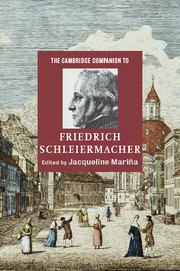Book contents
- Frontmatter
- Introduction
- Part I Schleiermacher as Philosopher
- Part II Schleiermacher as Theologian
- 6 Shaping an academic discipline: the Brief Outline on the Study of Theology
- 7 Sin and redemption
- 8 Christology and anthropology in Friedrich Schleiermacher
- 9 Schleiermacher’s understanding of God as triune
- 10 Providence and grace: Schleiermacher on justification and election
- 11 Schleiermacher’s Christian Ethics
- 12 Schleiermacher’s exegetical theology and the New Testament
- Part III Culture, Society, and Religion
- Schleiermacher Biography
- References
- Index
9 - Schleiermacher’s understanding of God as triune
from Part II - Schleiermacher as Theologian
Published online by Cambridge University Press: 28 August 2006
- Frontmatter
- Introduction
- Part I Schleiermacher as Philosopher
- Part II Schleiermacher as Theologian
- 6 Shaping an academic discipline: the Brief Outline on the Study of Theology
- 7 Sin and redemption
- 8 Christology and anthropology in Friedrich Schleiermacher
- 9 Schleiermacher’s understanding of God as triune
- 10 Providence and grace: Schleiermacher on justification and election
- 11 Schleiermacher’s Christian Ethics
- 12 Schleiermacher’s exegetical theology and the New Testament
- Part III Culture, Society, and Religion
- Schleiermacher Biography
- References
- Index
Summary
Christianity is a monotheistic religion along with Judaism and Islam, yet it alone professes that there is one God and three divine persons. The Trinity is integral to the distinctive Christian belief in God. The basic question is whether Christianity, in affirming the Trinity, is still a legitimate member of the trinity of monotheistic religions. Moreover, the affirmation of the Trinity raises epistemological, metaphysical, and theological issues that are central to the interpretation of Schleiermacher's views on the Trinity.
Schleiermacher has been severely criticized for his doctrine of the Trinity, perhaps more than for any other element of his theology. A recent review simply claims: “for Schleiermacher, the Trinity did not fit into the modern conscious concept of experience as the immediate self-consciousness of the believer.” Such a judgment reflects a common opinion. The interpretative issues, moreover, are aggravated by the conflicting shifts in Trinitarian theology within the twentieth century. The Neo-Orthodox critique of Schleiermacher emphasized the oneness of God while it argued for the Trinity on the basis of God's self-revelation. Karl Barth, for example, claimed that “the church with its doctrine of the Trinity was defending the recognition of God's unity, and therefore monotheism against the anti- Trinitarians.” Today, however, Barth's emphasis on monotheism is criticized. In contrast, Jürgen Moltmann contends that the doctrine of the Trinity served as a critique of a political monotheism, for the belief in a plurality of divine persons undermined the imperial political theology of the monarchy of the one emperor.
- Type
- Chapter
- Information
- The Cambridge Companion to Friedrich Schleiermacher , pp. 171 - 188Publisher: Cambridge University PressPrint publication year: 2005
- 2
- Cited by



